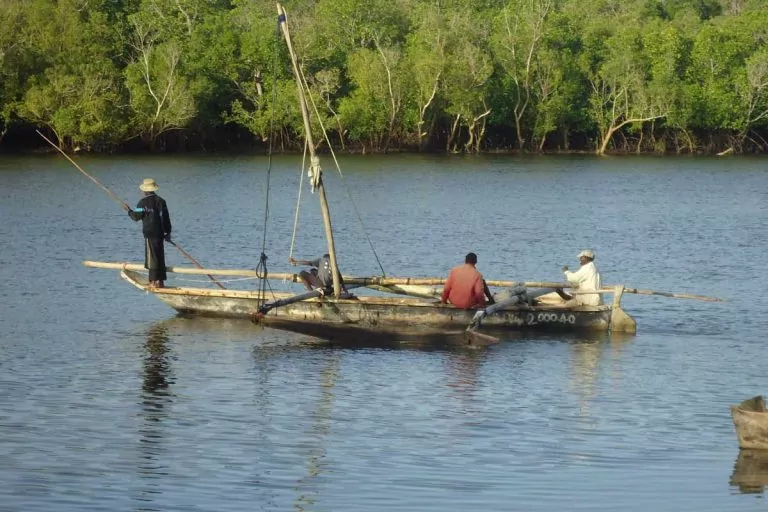Impact Story
Fishing Data East Africa (FiDEA)
Artisanal fisheries are crucial for the livelihoods of coastal communities in East Africa. Yet overexploitation and destructive fishing activities continuously harm the coastal and marine ecosystems, and the lack of data hinders an effective and sustainable fisheries management in the region. Fishing Data East Africa (FIDEA) addresses this lack head-on by developing a regional framework for the collection, sharing, analysis and reporting of fisheries data.
What unique issue is FIDEA addressing?
Despite the ubiquity of small-scale fisheries in East Africa, the region lacks both accessible data and applied management expertise. To preserve and promote sustainable fishery in East Africa, it is necessary to generate the missing data by restructuring the planning, collection, archiving and analysis of data and foster the appropriate utilization and dissemination of evidence-based information for decision making. The regional framework created by FIDEA will be used in science-based decision-making processes improve sustainable fisheries management. To achieve its goals, FIDEA has assembled a wide range of partners:
- National Institute of Fisheries Research (IIP) of Mozambique
- Tanzania Fisheries Research Institute (TAFIRI)
- Leibniz Centre for Tropical Marine Research (ZMT)
- Institute of Marine Sciences – University of Dar es Salaam in Zanzibar
What has been achieved so far?
So far, FIDEA has developed
- a regional strategy for systematic data collection and processing with national fisheries research institutes and regional fisheries organizations
- the digital data collection system (eCAS) by Tanzania Fisheries Research Institute (TAFIRI), which has been improved and adapted to the global fisheries reporting system
- a Data Collection Framework.
- a reporting template for reporting on the Sustainable development Goal (SDG) indicator 14.4.1 (proportion of a countries’ sustainably managed resources) in consultation with the Food and Agriculture Organization (FAO)
What else is worth mentioning?
FIDEA has also
- identified institutional training needs and capabilities to make recommendations for improving the existing training curriculum on data handling
- organized training workshops on data handling and analysis and created a training portal linked to online tools for analysing fisheries data
- formed a joint taskforce for the exchange of information on fisheries data, including members from the Ministry of Livestock and Fisheries in Tanzania
In what way has FIDEA contributed to fisheries data management in the region?
FIDEA has successfully linked policy makers and research institutes within the fishery sector with the support of regional and international partnerships, such as the Western Indian Ocean Marine Science Association (WIOMSA) and the Food and Agriculture Organization (FAO). Linking with the FAO enabled the project partners to conduct an extensive review of the fisheries information system in Tanzania, Zanzibar and Mozambique and gave the opportunity for the countries in the Western Indian Ocean (WIO) Region to review and submit their first report on the progress towards SDG 14.4.1. Through this process, FIDEA worked closely with the FAO to facilitate communication and coordination at the national level between research and management institutions on technical matters relevant to SDG 14.4 (regulating illegal and excessive fishing to restore fish stocks). FIDEA currently focuses on anchoring the data infrastructure to sustain a lasting effect and on the applicability of the research outputs for local decision makers.
FIDEA published studies and reports on challenges in collecting fishing data, actual data on fishery, fish stock assessments and sustainable fishery in the East African region.
FIDEA convened stakeholders from a range of target groups in different countries of the East African region, including policy makers from national ministries and authorities, fisheries managers, fisheries scientists and community representatives.
What has changed for local fisherfolk through the results of FIDEA?
Local fishers benefit from sustainable fisheries management, which ensures that their catch quotas remain secure in the long term. Direct participation of local fisherfolk in data collection also raises awareness of the need for balanced fishing practices. Improved datasets help decision-makers to enhance conditions of local fishers through informed management plans. By improving the framework of data collection, sharing, analysing and reporting as well as building a data infrastructure that can be further developed by local knowledge holders in the future, FIDEA is making a big contribution that not only benefits local fisherfolk, decision makers and researchers but is also potentially applicable to the entire WIO region.

